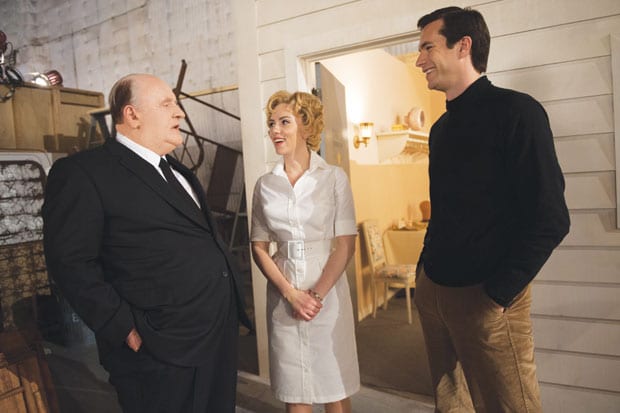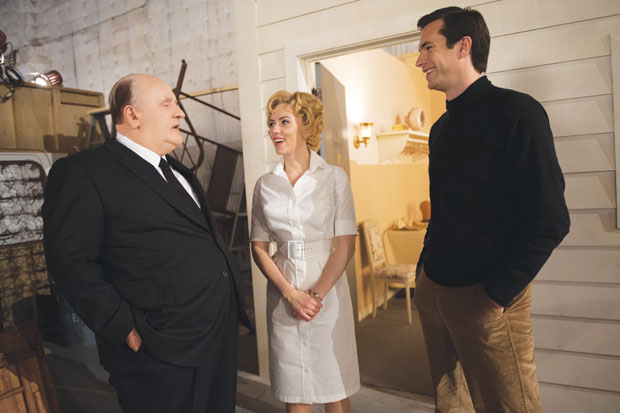There’s been an odd trend in recent years to name biopics after the subject, then concentrating just on a tiny sliver of their lives, a single incident that seemed to define them: The Queen, Lincoln, Capote. Amazingly, of these films, none more brilliantly distills the person to microcosm than Hitchcock. The director of dozens of films, most huge successes — before the modern era of cinecelebrity, he and John Ford were the only film directors whose names above the title meant something at the box office — Alfred Hitchcock’s words alone could fill countless volumes: His early silent thriller The Lodger; Rope, his single-shot riff on Leopold and Loeb; the classics Strangers on a Train, Rear Window, Dial M for Murder, North by Northwest; even his masterpiece, Vertigo, or his TV series. But this film sticks to one movie: Psycho.
Like Capote, however, this becomes an inspired framing device. No other Hitchcock film has had a popular legacy — just the words “Bates Motel” invoke instant imagery, and the term “shower scene” can only mean one thing … and you can hear the violins slashing as you read this, can’t you? But Psycho was also something of a departure for Hitch — a low budget, black-and-white B-movie that he elevated to cult status with an A-list cast and a savvy marketing campaign. He got the last of his five Oscar nominations for his work on it; he also lived comfortably on the income it generated.
But Hitch (played here with eerie verisimilitude by Anthony Hopkins) couldn’t have done it at all without his devoted wife Alma (Helen Mirren). Alma was his uncredited story editor, creative consultant, screenwriter, producer and cheerleader. She recommended Anthony Perkins (James D’Arcy) as Norman because, she felt, being a closeted homosexual would permit him to convey the duality of the character — a man with something serious to hide. She even suggested killing off the leading lady earlier than planned to really throw off the audience. And she did all this while enduring Hitch’s mood swings, his lecherous behavior toward a stable of blonde starlets (including prim housewife Janet Leigh, played here by Scarlett Johansson) and his unwarranted jealousy of her.
Hitchcock is that rarest of behind-the-scenes peeks at Hollywood, the kind that extrapolates character, even a touching love story, out of the banality of making a movie. The director, Sacha Gervasi, and the screenwriter, John J. McLaughlin, have given Hitch an invisible friend in the conscience of Ed Gein, the Wisconsin farmer whose murders inspired Psycho. He’s the devil on the shoulder, driving Hitch’s near-madness and adding depth to a familiar personality.
Of course, none of that would matter without Hopkins, dead-on as Hitch (he doesn’t so much look like the director as he does embody him), and Mirren, in another award-worthy performance. Their strained duet carries the wood and water, though everyone — especially D’Arcy, who holds his body in ways that conjure Perkins exactly, and Johansson, in one her most open screen performances — acquits themselves tremendously. Gervasi’s look (all retro Technicolor and VistaVision glamour and Edith Head-like costuming) and sense of black humor (all the jokes land beautifully) add to the Gestalt. Without becoming a navelgazing exercise in fanboydom, Hitchcock creates a crackling thriller worthy of The Master.
— Arnold Wayne Jones
Four stars. Now playing at the Angelika Film Center Mockingbird Station.
This article appeared in the Dallas Voice print edition November 30, 2012.
















